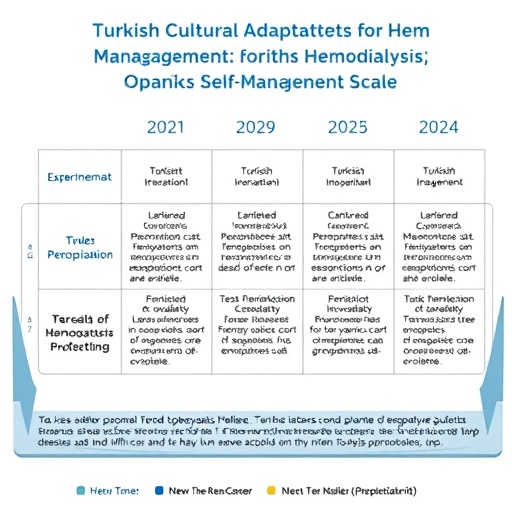The ongoing quest for improved patient empowerment in chronic disease management has led to significant advancements in self-management strategies, particularly for individuals undergoing hemodialysis. A recent study spearheaded by Coşkun and Yakar has significant implications for the Turkish population, wherein they meticulously adapted the Hemodialysis Self-Management Scale to resonate with cultural nuances while ensuring comprehensive psychometric reliability. This adaptation is pivotal, as self-management in chronic illnesses like renal failure often correlates with better health outcomes through enhanced patient engagement.
The Hemodialysis Self-Management Scale serves as a vital tool designed to evaluate patients’ abilities to manage their care effectively. Originally developed in a different cultural context, the necessity to adapt this scale for Turkish patients underscores the importance of cultural relevance in healthcare. The research team employed rigorous methods to translate and validate the scale, ensuring linguistic accuracy and cultural resonance. Their approach included cognitive interviews with patients to identify potential misunderstandings and cultural barriers that might affect the comprehension of the items in the scale.
Throughout their investigation, Coşkun and Yakar emphasized the multifaceted nature of self-management, which encompasses not only medical adherence but also emotional and psychological dimensions of the patient experience. The study highlights an emerging recognition that mental well-being is intrinsically linked to physical health outcomes, especially in chronic conditions requiring ongoing management. By prompting individuals to engage in their care processes proactively, broadening the understanding of self-management allows for the incorporation of lifestyle factors that significantly impact the efficacy of treatment.
Understanding that each cultural group may approach health management differently, the adapted scale introduces culturally pertinent variables that may strengthen patient compliance and optimism in treatment outcomes. The researchers employed a thorough psychometric evaluation which included assessments of reliability and validity, ensuring the adapted tool is both applicable and trusted by Turkish-speaking patients. The significance of this study lies not only in its immediate contributions but also in its potential to influence future research catalyzing similar adaptations in various cultural contexts, leading to international dialogues on best practices for chronic disease self-management.
Published in the Journal of Artificial Organs, the study lays a foundation for further exploration of culturally adapted measurement tools in healthcare. The psychometric properties established through this research can serve as a benchmark for future studies aiming to evaluate self-management in diverse patient populations. As chronic diseases become more prevalent globally, the need for culturally competent healthcare systems becomes increasingly critical. The researchers argue that adapting assessment tools for cultural specificity is not simply a methodological choice, but a moral imperative to optimize patient care.
Interestingly, the assessment of self-management in hemodialysis does not just reflect individual practices but also offers insights into the healthcare system’s responsiveness to patient needs. The two researchers pooled together a comprehensive set of data reflecting the lived experiences of diverse patients, steering their study towards a direction that prioritizes patient narratives. Such insights can lead to improved health policies that resonate more profoundly with patients’ realities, thus enhancing the overall efficacy of chronic disease management programs.
The implications of the study extend beyond the Turkish patient community; they serve as a model for global healthcare initiatives and reforms aimed at patient-centered approaches. The dialogue surrounding patient self-management is becoming more prominent in healthcare discussions, signaling a shift towards valuing patients as active partners in their care. This major pivot aligns well with global health challenges, especially in the wake of the COVID-19 pandemic, where self-management practices have proven essential in maintaining health standards amidst widespread systemic pressures.
Through their investigation, Coşkun and Yakar seek to ignite a conversation about the broader implications of self-management strategies in chronic disease prevention and treatment. Their research highlights the need for continuous adaptation and evolution of healthcare practices in response to the specific cultural contexts in which patients live. As healthcare systems continue to grapple with issues of accessibility, efficacy, and patient satisfaction, the study reinforces the vital role of empirical research in informing transformative healthcare policies.
Furthermore, the emotional aspects tied to self-management are paramount, especially in populations with chronic illnesses. Hemodialysis patients frequently navigate a challenging landscape of physical health challenges and mental health struggles. Delivering culturally aware and sensitive care approaches can significantly alleviate some of the psychological burdens these individuals carry. The newly adapted scale promises to usher in a forward-thinking dialogue around integrating mental health support within the broader framework of chronic disease management.
Finally, as we reflect upon this significant piece of research, one can surmise that the benefits of culturally informed healthcare practices extend not only to improved clinical outcomes but also to heightened levels of autonomy, satisfaction, and happiness among patients. Such adaptations pave the way for more personalized healthcare, recognizing that no one size fits all. The totality of the evidence presented in this study captures a nuanced understanding that language, culture, and healthcare converge in ways that can ultimately dictate patient experiences and outcomes.
As we continue to unravel the complexities surrounding patient self-management in chronic conditions, the findings from Coşkun and Yakar will likely echo throughout the field, prompting healthcare providers to reassess their approaches. The call for cultural adaptability in self-management tools is a clarion reminder that effective healthcare must consider the diverse tapestry of patient experiences, ultimately aiming towards inclusive and responsive care for all.
In conclusion, the adaptation of the Hemodialysis Self-Management Scale is a monumental step towards advocating for enhanced patient involvement in healthcare decisions. It marks a vital progression towards ensuring patients have access to the tools they need to manage their health effectively, in a way that resonates deeply within their cultural context.
Subject of Research: Adaptation of the Hemodialysis Self-Management Scale into Turkish culture
Article Title: Adaptation of the hemodialysis self-management scale into Turkish culture: a psychometric study.
Article References:
Coşkun, Ö., Yakar, H.K. Adaptation of the hemodialysis self-management scale into Turkish culture: a psychometric study.
J Artif Organs 28, 415–422 (2025). https://doi.org/10.1007/s10047-025-01498-8
Image Credits: AI Generated
DOI: https://doi.org/10.1007/s10047-025-01498-8
Keywords: Hemodialysis, self-management, cultural adaptation, psychometrics, patient empowerment.




